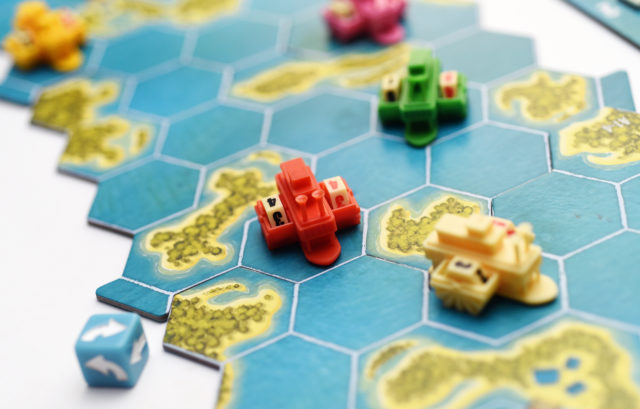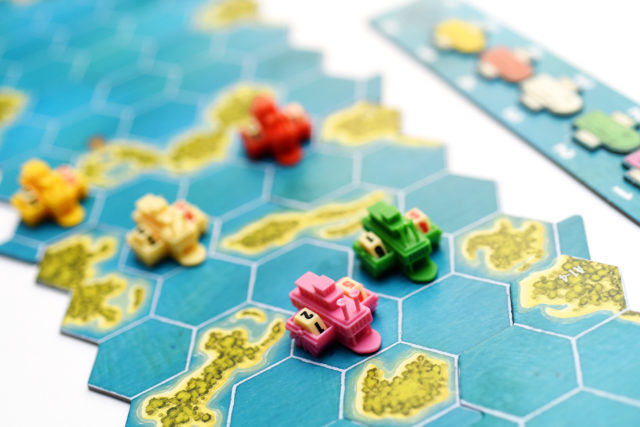I’m sure many of us hobby board gamers have types of games we gravitate towards, and those that we may not be all that interested in. Besides my well-established love of customizable card games, I tend to gravitate towards worker-placement as a mechanic, and I’m not too fond of race games. I don’t think there’s anything wrong with race games, but they just don’t appeal to me. To some, then, it may be incongruous to hear that Mississippi Queen (with the Black Rose expansion), was a grail game of mine for some time.
Designed by Werner Hodel, Mississippi Queen was first published by Goldsieber Spiele in 1997, and won the Spiel des Jahres that year. The game eventually found its way into the North American market through Rio Grande Games, but after an initial printing, was long out of print. I did eventually track down a copy, and it has made many appearances at game days. When it did hit the table, there was often a lot of flipping through the rule book, and muttering about some things that weren’t totally clear, and moaning about the components that were not the greatest. I was quite excited, then, when it was announced that Super Meeple would be reprinting the game this year!

In Mississippi Queen, you race steam-powered paddle wheelers down the Mississippi. It is this theme that immediately attracted me to the game. The idea of paddle wheelers – large, slow moving pleasure boats – racing creates quite the juxtaposition in my mind that always makes me laugh. The goal of the game is to be the first paddle wheeler to cross 12 river tiles (each of about four hexes in length), to reach the end of the mighty Mississippi. There is a catch, though (there’s always a catch). In order to win, you have to arrive with exactly two passengers. Passengers are picked up from islands along the way.
Turn order is determined by position in the race. The furthest ahead goes first. On your turn, you must move a number of hexes exactly equal to your speed, and you may make one hex-face turn. At the start of the game your speed is set to one. Before you move on your turn, you may adjust your speed up, or down, by one for free, to a maximum speed of six. Paddle wheelers also start with six coal. You may spend a coal to adjust your speed up or down at a cost of one point of speed per coal spent. During your move, you may make additional hex-face turns at a cost of one coal per turn. Once your six coal is spent, it’s gone, so plan accordingly!

Ah, planning accordingly. The thing is, the entire river is not set out at the start of the game. The game starts with a start tile and one river tile. When the first paddle wheeler crosses onto that river tile, the second tile is drawn. The third tile is drawn when a paddle wheeler crosses to the second, etc. These tiles contain the islands where you will pick up passengers, but jumping on to moving boats is hard, so you have to be at a speed of exactly one to pick up passengers. Oh, jumping off moving boats is hard, too, so you have to end the race with a speed of exactly one.
The game takes careful planning, but you don’t have perfect information to plan with! This is the fun of Mississippi Queen to me. You might be cruising down the river at a speed of three or four, when suddenly there’s a nasty turn with some islands in the middle of the river – slow down! Slow down!
The game also contains two modules for more advanced play. The first is a group of six tiles with navigation hazards: sandbars and logs in the river. These tiles swap in to replace some of the basic game tiles. The navigation hazards make the game slightly more thinky, and can present some real challenges to finishing the race. The second is the mysterious Black Rose paddle wheeler, a boat that the player in last place controls. It can be used for a minor take that element – blocking the path of the boat in first place, for example.

Mississippi Queen is a really fun, fast-paced racing game. The basic game plays in about thirty minutes, and with the advanced modules it still plays in about an hour or less. There’s very little down-time in the game, and it illicits a lot of laughs. The game is just thinky enough to keep you engaged, but it doesn’t burn your brain. The river tiles are modular, so there’s a high degree of replayability. The base game is easily family or gateway game weight, and my group of gamers still really enjoys it with the advanced modules. Our resident colour-blind character reports that, for him, the boats are all easily distinguishable and the game is one of the most colour-blind friendly games he’s played.
Let me briefly touch on some of the changes between the Rio Grande and Super Meeple version. Gameplay wise, there isn’t much different at all, honestly. But the Super Meeple version really, really improved the readability of the rulebook. It’s very easy to read, and many of the things that made me scratch my head in the old game are crystal clear here. The component quality has increased, which is good, and there are a few player aids, like a turn order track, in the Super Meeple version that really improve the play of the game. Super Meeple has done good work here.
Mississippi Queen remains a top-game for me. I really love both the idea of racing old-timey paddle wheelers, and the actual game play of the game. It’s an easy to pick up race game. If, like me, you only want one race game in your collection, consider Mississippi Queen.
Comments
No comments yet! Be the first!